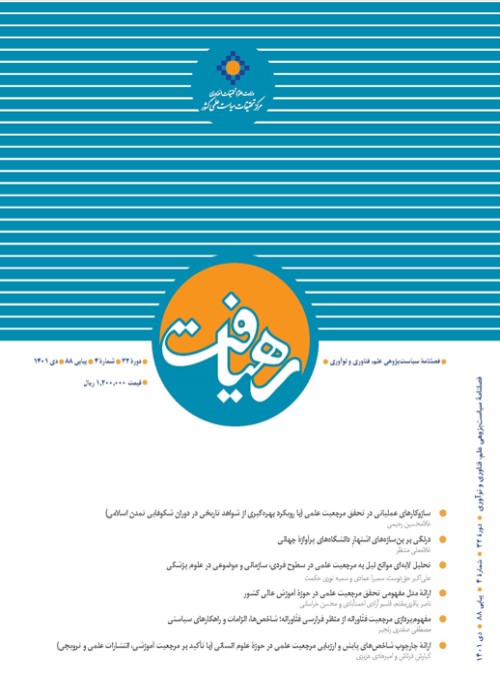Two competing views on the concept of scientific authority: explanation and evaluation
Author(s):
Article Type:
Research/Original Article (دارای رتبه معتبر)
Abstract:
The present work tries to clearly explain the existing duality regarding the concept of scientific authority ("marjiyat") among politicians and policy researchers in the field of science policy by reviewing the existing articles and research works and specifying the characteristics of each of the opposite points of view to make science policy avoid policy divergence caused by verbal similarity.Historically, scientific authority, along with political authority, has been considered one of the dimensions of the authority of the infallible imams. After the statements of the Supreme Leader in 2006 with the students and professors of Imam Sadegh University, the concept of scientific authority entered the vocabulary of Iran's science policy and attracted the attention of researchers. In the following years, attention has been paid to the discussion of scientific authority in the academic environment of Iran, and in addition to the publication of various articles, the spring 2018 special issue of the Iranian Journal of Culture and Health Promotion has also been dedicated to this subject. Most of the existing research has been focused on the statements of the Supreme Leader and high-level policy documents about scientific authority and has considered this concept separate from similar concepts in the global/ English research literature of science policy. Researchers have also dealt with the relationship of scientific authority with soft power and national authority and modeling the methods of achieving scientific authority.The review of the available articles shows that there is no comprehensive intersubjective definition of scientific authority among Iranian politicians and policy researchers. The existence of multiple and incompatible definitions and the need to achieve a specific definition of scientific authority have been the concern of some researchers, but the duality of introspection and extroversion, as the root of the inconsistency of definitions, has not been investigated in any of the previous articles.In this research, a systematic review of the available articles was used based on the NoorMags index. Articles that included the term "scientific marjiyat" in their title, abstract, or keywords were examined in this research. Furthermore, the special issue of "Iranian Journal of Culture and Health Promotion" for scientific authority and the articles of the Islamic-Iranian Model of Progress Conference were used as additional sources. The scope of the research was limited to published Persian sources about scientific authority; because scientific authority, in the common policy sense in Iran, is a concept invented locally, and similar concepts in the global research literature cannot represent what and why the concept of scientific authority is.In the next stage, after sifting the articles twice, a thematic analysis of the articles was used to extract the main themes raised in them to define and explain the nature of scientific authority. The main themes were divided into two categories, inwards and outwards, and an attempt was made to explain the nature of each of these two categories and to introduce examples of important sources written based on each perspective.: After sifting the articles, 36 articles were reviewed. Most of them were written in the years 2016 and later, and in the first decade after the topic of scientific authority was raised, this issue was not seriously studied by researchers. After reviewing the articles, 20 main themes were found about what scientific authority: the status of the country, universities, researchers, articles and scientific journals in global rankings; relying on useful science and practical effectiveness; problem-oriention and community needs; scientific independence of the country and freedom from scientific captivity; being global reference point; Islamic orientation and adherence to religious thinking; transforming Persian into an international scientific language; theorizing and expanding the boundaries of science; existence of the complete chain of technology and innovation; global science production pole; self-esteem; historical perspective to scientific authority; global access to scientific products; leadership and non-passive approach in science production; scientific authority and unquestionability of scientific statements; attracting talented people; appropriate research budget in the field of science and technology; becoming a global model of science production; fame as a scientific reference and social image management; and authoring scientific reference books at the global level. These categories can be classified into two groups: inwards and outwards. Outward-looking themes emphasize the definition of the position of scientific authority based on a country's scientific connections with others and the country's position in international scientific communities, and they give importance to international rankings and global scientific communities. On the contrary, inward-looking themes focus on the internal aspects of scientific authority and follow the production of useful science and its use. Some researchers, due to not paying attention to this conceptual duality, have suffered contradictions in their opinions and internal confusion in their writings.Despite the extensive use of an inward-looking point of view by many politicians and political researchers, this point of view is incompatible with the traditional definitions of authority and in practice, it does not provide a proper explanation of scientific authority. "Marja" in the literal meaning and its historical usage means the place of reference. By accepting this definition, marjiyat cannot exist without referents, and scientific reference is defined concerning others and, as a result, in the domain of international scientific communities. The inward-looking perspective does not provide any self-sufficient evaluation criterion. The usefulness, practicality, and impact of science in practice should also be measured in comparison with other countries and based on global rankings of innovation, economic development, etc. Furthermore, in the current situation, the transformation of Persian language into the international language of science does not seem close.Politicians and policymakers should determine their operational definition of scientific authority based on one of the two perspectives presented before making any policy decision and using any type of political tool to improve the state of scientific authority in the country, and their expectations and evaluation criteria should also be based on the selected point of view. Based on what has been said, they have to use an outward-looking perspective in order to have a realistic analysis of scientific authority.
Keywords:
Language:
Persian
Published:
Rahyaft Journal, Volume:32 Issue: 87, 2022
Pages:
21 to 32
magiran.com/p2660082
دانلود و مطالعه متن این مقاله با یکی از روشهای زیر امکان پذیر است:
اشتراک شخصی
با عضویت و پرداخت آنلاین حق اشتراک یکساله به مبلغ 1,390,000ريال میتوانید 70 عنوان مطلب دانلود کنید!
اشتراک سازمانی
به کتابخانه دانشگاه یا محل کار خود پیشنهاد کنید تا اشتراک سازمانی این پایگاه را برای دسترسی نامحدود همه کاربران به متن مطالب تهیه نمایند!
توجه!
- حق عضویت دریافتی صرف حمایت از نشریات عضو و نگهداری، تکمیل و توسعه مگیران میشود.
- پرداخت حق اشتراک و دانلود مقالات اجازه بازنشر آن در سایر رسانههای چاپی و دیجیتال را به کاربر نمیدهد.
In order to view content subscription is required
Personal subscription
Subscribe magiran.com for 70 € euros via PayPal and download 70 articles during a year.
Organization subscription
Please contact us to subscribe your university or library for unlimited access!



